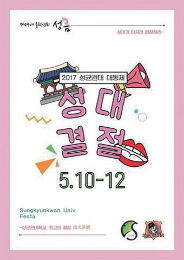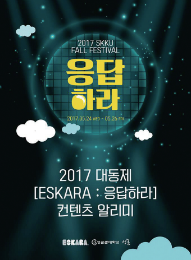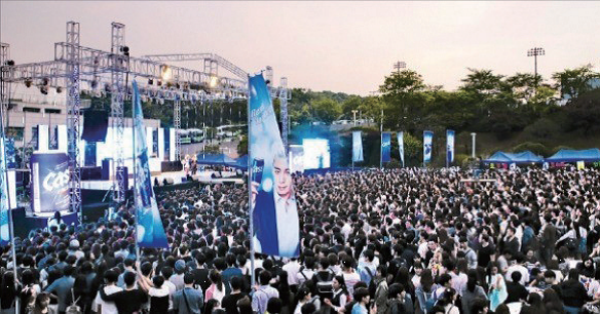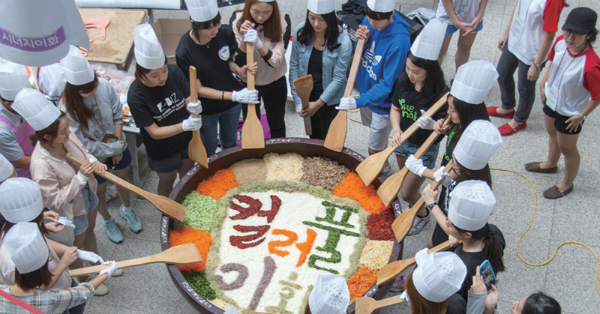In May, many university students feel excited, not only as the midterm exams are over, but also as many universities hold festivals. University festivals are a chance for many musical or dance performance clubs to show their hard work in front of an audience. It is also a good time for students who are tired due to the midterm exams to eat tasty food and relax. Even though university festivals can be controversial, they are definitely one of the charms of campus life in Korea. The Sungkyun Times (SKT) now examines university festivals, analyzes the controversies over them and figures out how they could develop in the future.
The University Festival: Daedongje
The History of the University Festival
According to the National Archives of Korea (NAK), the history of university festivals traces back to about 600 years ago at Sungkyunkwan, the only national university of the Joseon Dynasty (1392-1897). At that time, Sungkyunkwan opened the dormitory during the festival so that visitors could enter on that day. Parents and relatives also participated in the festival, and got to enjoy food and games in the front yard of Myeongnyundang, the lecture hall of Sungkyunkwan.
A more modern form of university festivals started at Shinheung University in 1956, which later became Kyunghee University (KHU). Since then, university festivals have been held at every university. University festivals in the 1960s served as a transmitter of Western cultures such as folk dances and costume parades. Major programs included marathons, pair parties (where people danced in pairs), May Queen Contests (beauty contests that used to be held in universities every May), an academic festival, a literary society, and campfires. Some criticized that university festivals had too many Western elements which made the festivals feel awkward, arguing that they needed to include more Korean traditional events. As a result, in the 1970s, the “talchum revival movement” took place at university festivals. Folk games such as talchum, a Korean traditional mask dance, ssireum, Korean wrestling, and a tug-of-war, became major events at festivals. Meanwhile, madangguk, one type of traditional Korean performance, and student activists’ performances performed a function of criticism and satire on society. Then, in the 1980s, the name of university festivals changed to “Daedongje” which means “to come together in unity.” Korea University (KU) used the term “Seoktap Daedongje” for the first time in 1984. After the mid-1980s, most universities started to call their festivals “Daedongje.” Around that time, events such as political academic festivals, discussion forums, and mock trials were held frequently at university festivals. Many festivals were delayed or cancelled because of frequent demonstrations as well. As interest in the unification with North Korea surged, many universities also put “Unification Daedongje” as a theme at their festivals. In the late 1980s, however, as criticism that universities were becoming excessively leftist-leaning increased, university festivals gradually began to become depoliticized. After the mid- 1990s, folk and political colors disappeared at many university festivals, and the festivals started to consist of interesting events like baby face contests, street markets, and entertaining events such as performances of singers instead. Namely, an era in which individuality and diversity were considered more important had arrived. After the 2000s, most university festivals started to consist of performances of popular singers and food or drink stalls run by major departments or school clubs.



The Views and Controversies over University Festivals
Disappearance of Unique Culture of University Festivals’ vs. Importance of Enjoyable Festivals
Since the main programs of most university festivals are celebrities’ performances and food and drink stalls run by students, there is a criticism that there is no room for unique programs that really allow students to be at the center. Usually, 50~70% of budgets for university festivals are covered by student union fees or financial support from school, and the rest by corporate sponsorship. Most of the budgets, then, are spent for installing the main stages or inviting celebrities. According to the Ministry of Education, the cost of inviting celebrities accounts for about 43% (34.11 million) of the festival budgets at 124 universities. Since the financial support of the school is quite similar every year, the scale of the festivals may highly depend on corporate sponsorship. As a part of the sponsorship, booths of the sponsored corporations are often opened at the festivals, taking up the spaces where students may have been able to set up their own booths. As an example, in 2017, the alcoholic beverage company, Oriental Brewery (OB), not only supported 10 university festivals but organized their entire programs, hosting a “Cass Concert” to promote their products. The “Cass Concert” was hosted at SKKU as well on the second day of Daedongje, showing an advertisement of Cass Beer on an electronic board in front of the main stage and installing a large display of their products on the ground.
On the other hand, some argue that festival programs should include programs that students can participate in and be satisfied with the content according to their opinions. According to a survey of 300 university students’ recognition about university festivals by Daehaknaeil’s 20lab, more than half of the respondents (52%) responsed that they would prefer to see celebrities’ performances at university festivals. Meanwhile, 90% of the respondents said that they wanted food and drink stalls to be installed at university festivals. This shows that students expect university festivals to include celebrities’ performances and food and drink stalls. In fact, if universities do not invite celebrities to their festivals, the students’ participation rate declines. In 2012, for example, the student council of Sogang University hosted a festival consisting of performances of 18 indie bands instead of popular idol groups. After the list of invited singers was advertised, however, some opinions were posted on the school homepage, saying that the school should respect the students’ preference to see performances of celebrities. Therefore, in 2013, the student council went back to inviting famous celebrities such as Jay Park and Dynamic Duo.

Controversies over University Festivals
According to one survey on university festival recognition, the respondents said “corruption of university festivals’ operators” (23.7%), “drunk behavior and violence” (27.1%), “sensational events at stalls” (20%) should disappear at university festivals.
Regarding the corruption problem, there was even a case where a student council embezzled some of the budgets for inviting celebrities. As cash is not easy to track if used through the name of “festival”, accounting irregularities are likely to occur. If there is no whistleblower or proof from the student council, the school cannot simply intervene in the money flow because it is run independently by the school council. What is worse, it is hard for students to notice even if the student council manipulates the accounting. In February 2013, for example, seven people including the members of student councils of universities in the capital area were indicted for receiving tens of millions of won worth of rebates. A “rebate” refers to the behavior of paying back some of the given product or amount of money to the giver; or, the amount of money itself. Three student council members received 5 million to 40 million rebates by making orders for festivals and events with only one company. In order not to leave any evidence, they usually met and made a deal at a coffee shop or the student council office.
Secondly, excessive drinking at university festivals may cause big incidents. For example, in 2013, students, researchers, and even professors were caught out during a crackdown on drunk driving after a university festival with blood alcohol levels high enough for their driver’s license to be revoked. Meanwhile, in May 2017, one man was brought to a trial for sexually assaulting a girl at a university lab after drinking at the festival.
Lastly, improper themes of food and drink stalls to attract customers at university festivals can cause issues. In September 2015, for instance, Hanyang University’s festival was canceled because there was a stall which named its menu after Oh Won-choon, a murderer, and Ko Young-wook, who had been arrested for engaging in illicit sex with a minor.
The Way Forward for a Better University Festival
Schools, students, and student councils should cooperate for making university festivals more enjoyable by gathering students’ opinions. Sookmyung Women’s University (SMU) has been asking for students’ opinions about the university festival through the school homepage every year. It is a good example for many university festivals to gather opinions about inviting celebrities and programs about the festivals.

Formation of Student-Centric Culture
It is obvious that students should be the center of university festivals and be the hosts to programs related to majors or social issues. For example, in 2016, Ewha Women’s University operated a “solidarity booth” with various social organizations as well. For instance, there was a farmers’ market which sold food like pajeon, Korean pancakes with spring onions, made of products from all over the country, at a low price. There were also various booths where, not only students, but also a lot of other people could think about social issues, such as a booth for the homeless from Big Issue magazine, the sinking of the Sewol Ferry Disaster, and comfort women issues. In 2017 Haengnimje, the festival of the Association of Korean Medical Students, consisted of programs such as exchanges between independent student organizations, an athletics meeting, and a rock festival. There was also a round table meeting of 500 people to discuss issues in Korea, which was praised for showing the positive characteristics of universities.
Various Campaigns to Prevent Incidents in Festival
Since a lot of incidents have been occuring constantly at university festivals, universities are working on many campaigns that can prevent incidents and clean up the campus before and after the festivals. In 2017, for example, the student council of Korea University (KU) made specific standards for its festival; expressions or words that might prejudice or cause violence against any specific group were defined as “disgusting statements” and were given warnings. In accordance with such efforts, SKKU’s student council S:with is also planning to give an orientation on students to prevent incidents caused by drinking and to cooperate with the police during the school festival. In addition, S:with is going to purchase alcohol in plastic bottles to prevent dangerous incidents caused by glass bottles. At this year’s festival, it is going to request students to clean up their food and drink stalls after the festival and will deduct from their deposit if they do not clean the stalls properly.
Daedongje is just about to be held again. As many Kingos are expecting the school festival, the student council S:with should reflect on the opinions of Kingos to prepare and host for the festival programs and safely complete them without any incidents.
